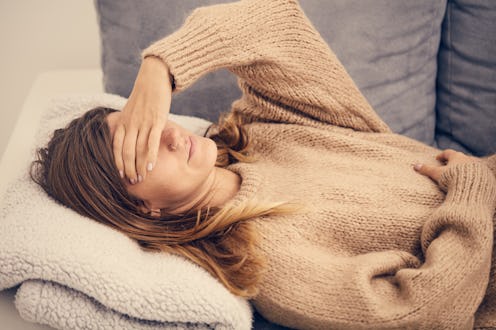Life
Here’s How The End Of Daylight Savings Can Affect Your Sleep — And What To Do About It

Daylight Saving Time officially ends at 2 a.m. on Nov. 6, which means you get to set your clock a whole hour back. So if you get up at 9 a.m., it's like you really slept until 10 a.m., right? It’s kinda like winning the sleep lottery, especially if you don’t have to be anywhere that day. But Daylight Savings' ending can actually affect your sleep in some pretty sneaky ways.
For one, even though it might seem like you just scored some extra rest, it’s not that simple. According to Harvard Health, that small, one-hour shift in your sleep schedule can affect you (negatively) for up to a week after Daylight Saving Time ends. That might not seem like a big deal at first, but it means you could wake up earlier than you want to, have trouble falling asleep, and are more likely to wake up throughout the night, says Harvard Health. But it’s not just your sleep that’s affected by the time change. The Mondays following Daylight Saving usually see more traffic accidents, workplace injuries, and heart attacks, according to ABC News and LiveScience.
ABC News actually compared the effects of Daylight Saving Time to jetlag: it takes a few days for your body to adjust to the time change. That’s because your circadian rhythm has been pushed backward or forward by an hour, says ABC News, as if you’ve traveled to a place in a different time zone.
Your circadian rhythm is the process that takes place in your body that regulates your body temperature, stress levels, appetite, metabolism, and your desire to sleep. So, basically, if your circadian rhythm is off, you feel pretty funky. And, like jet lag, it takes a few days for your circadian rhythm to get back on track, says ABC News.
To minimize the effects of Daylight Saving, Cleveland Clinic recommends preparing your body for the time shift by going to bed 15 or 30 minutes early for a few days before you turn the clocks back. Try not to drink coffee or other caffeinated beverages at least four to six hours before you go to bed, says Cleveland Clinic, and keep in mind that drinking alcohol late at night can keep you from getting quality sleep. And resisting the urge to take naps is the key to adjusting to the time change, according to Cleveland Clinic. Similarly, maintaining a consistent bedtime and wakeup time, even on weekends, can boost your overall sleep quality, and make it easier for you to get to bed faster.
NBC News also recommends getting in some exercise, like a short walk or just going up some stairs, to give you a little boost of energy and help you prep your body for your new bedtime. But if your body is really telling you to slow down, says NBC News, make sure you listen to what your body is telling you.
If you’ve been wondering why you suddenly feel so sluggish around this time of year, now you know: it’s the cruel, deceptive time change. But with a little self-care and a few days to adjust, your body’s circadian rhythm will be back to normal in no time.